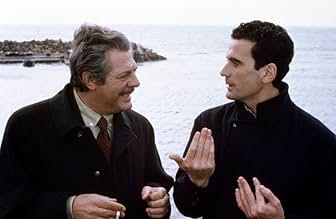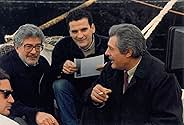IMDb-BEWERTUNG
7,3/10
1419
IHRE BEWERTUNG
Füge eine Handlung in deiner Sprache hinzuThe visit of a lawer to his military son is an opportunity to recall the past, discuss the future and find a meeting point between two diametrically opposite personalities.The visit of a lawer to his military son is an opportunity to recall the past, discuss the future and find a meeting point between two diametrically opposite personalities.The visit of a lawer to his military son is an opportunity to recall the past, discuss the future and find a meeting point between two diametrically opposite personalities.
- Regie
- Drehbuch
- Hauptbesetzung
- Auszeichnungen
- 5 Gewinne & 7 Nominierungen insgesamt
Empfohlene Bewertungen
'Che ora è', Ettore Scola's 1989 film, is an admirable demonstration of the fact that great films can often be simple and that sophisticated effects or complex plots are not always necessary to reach the hearts of viewers. All one needs is a script that tells a story or describes a true situation in words that work well on screen and the right actors to transform the images into living episodes that move or convey meaningful messages. Sounds simple, right? But how many directors have the talent, luck and audacity to make such movies? Ettore Scola is certainly one of them and if 'Che ora è' is a rarely mentioned and perhaps lesser known entry in his filmography, it is time, I think, for a re-evaluation.
The film tells the story of a day in the lives of a father and his son who meet after many years of distance - perhaps not so much geographically, but emotionally. Marcello, the father, is a very wealthy lawyer who has no problem making expensive presents such as an apartment in the center of Rome or a luxury car. Michele, the son, is in the military and doesn't really seem to know what he wants to do with his life. The father comes from Rome to the harbor town of Civitavecchia where his son is serving to spend a day with him and try to get to know him better, to guide him and help him in the way he believes is best. The two men are very different, however. Gradually, we understand that it is not just a generation gap and a difference in communication styles. Marcello had been a busy and absent father. The attempt to reconnect with his son is belated, accompanied by exaggerated gifts, inappropriate advice, intrusive pressure. There is a lot of talk, but verbal communication does not work well. The opening that occurs at a certain point is occasioned by shared memories and the watch inherited from Marcello's father, Michele's grandfather, which is for the latter a more precious gift than all the other treasures offered by his father. The two may get to know each other a little better, but their worlds remain different. As normal, after all.
I have already said that there is a lot of talking in the film, and perhaps some viewers will be bothered by this aspect. I think that for the screenwriters the verbosity (excessive even for an Italian film) was intentional. In this way they emphasized better than anywhere else that in communication words do not always help and sometimes even harm - they mask and distort. The moments of closeness are non-verbal, and perhaps it would have been good if there were a little more of them. The interpretation of the two actors is masterful. For Marcello Mastroianni this is one of the most impressive roles of the (too early) end of a formidable career. Massimo Troisi is an excellent partner and the two of them are believable and moving. I think many of the men who saw this film recognized themselves in the characters of the father and the son, maybe in both. I dare say that 'Che ora è' (no question mark, THIS is the original title!) is one of the most moving films about father-son relationships ever made.
The film tells the story of a day in the lives of a father and his son who meet after many years of distance - perhaps not so much geographically, but emotionally. Marcello, the father, is a very wealthy lawyer who has no problem making expensive presents such as an apartment in the center of Rome or a luxury car. Michele, the son, is in the military and doesn't really seem to know what he wants to do with his life. The father comes from Rome to the harbor town of Civitavecchia where his son is serving to spend a day with him and try to get to know him better, to guide him and help him in the way he believes is best. The two men are very different, however. Gradually, we understand that it is not just a generation gap and a difference in communication styles. Marcello had been a busy and absent father. The attempt to reconnect with his son is belated, accompanied by exaggerated gifts, inappropriate advice, intrusive pressure. There is a lot of talk, but verbal communication does not work well. The opening that occurs at a certain point is occasioned by shared memories and the watch inherited from Marcello's father, Michele's grandfather, which is for the latter a more precious gift than all the other treasures offered by his father. The two may get to know each other a little better, but their worlds remain different. As normal, after all.
I have already said that there is a lot of talking in the film, and perhaps some viewers will be bothered by this aspect. I think that for the screenwriters the verbosity (excessive even for an Italian film) was intentional. In this way they emphasized better than anywhere else that in communication words do not always help and sometimes even harm - they mask and distort. The moments of closeness are non-verbal, and perhaps it would have been good if there were a little more of them. The interpretation of the two actors is masterful. For Marcello Mastroianni this is one of the most impressive roles of the (too early) end of a formidable career. Massimo Troisi is an excellent partner and the two of them are believable and moving. I think many of the men who saw this film recognized themselves in the characters of the father and the son, maybe in both. I dare say that 'Che ora è' (no question mark, THIS is the original title!) is one of the most moving films about father-son relationships ever made.
10lobo-21
I think both men and women at the screening I attended identified with at least one of the main characters. Mastroianni and Troisi complement each other perfectly in this honest portrayal of a parent whose grown son is a stranger. It's a shame this was never widely seen in the US.
Massimo Troisi is known abroad mostly for "Il Postino" and in Italy is remembered especially for his first comedy films but also the ones who appreciate him have never seen this movie and that's a shame 'cause here we see one of the best Troisi's performances where we can enjoy his talent as a dramatic actor not "just a comedian" (expression used by some, but we cinephiles know that real comedians are the best actors ever, just to name another Neapolitan like Troisi: Totò). For the third time Massimo doesn't work as a writer or director as in all his previous films - the first was in "Hotel Colonial" by Cinzia Th. Torrini then "Splendor" always by Ettore Scola (there will be another last one from this "trilogy" Scola-Troisi, "Captain Fracassa's Journey"). Then there is Marcello Mastroianni, just one of the greatest Italian actors of all time. This film an intimist trip of something never too much analyzed in the world of the seventh art: the father-son relationship. Here, as in the real world, upside down sometimes, quarrels and conflicts of two generations, everyone can identify itself in the two figures, one or the other during the viewing. Marcello and Massimo seem so natural like a real father and son. They received together "Volpi Cup for Best Actor" and Troisi also a "Pasinetti Award for Best Actor" at Venice Film Festival. No need for other actors, just a few, the right frame of this wonderful portrait.
Grazie Ettore Scola.
Mastroianni and Troisi show in this movie what it means to be a honest actor. They act in the Italy of the late 80s. The feelings of modernity mix with the memories of the past. Mastroianni is a father who doesn't know his son for who he truly is. This makes him suffer, nonetheless Scola sends the message that it is never to late to sort out some sort of compromise between a father and son who love each other. Troisi on his part represents a character who lives life without all the fuss buzzing the 'successful' life. In those days as well as today a really difficult thing to do. The simplicity and cleanliness with which they share their feelings as characters is really fulfilling. This movie is a gift they made to us and both actors and director delivered a truly minimalist piece of art. Thank you!!!!
"Che ora è?" is a great minimalist movie, since it makes you feel the love, and in the same time the disease between a father and a son through simple attitudes, and words ("what time is it?"!!). And such feelings can make you suffer - but a little bit, but in a light way - since they are true. Marcello Mastroianni and Massimo Troisi are so perfect playing their parts, that you may believe Marcello to be your father and Massimo to be your son. It's a shame this is not one of the most famous movies by Ettore Scola, also in Italy.
Wusstest du schon
- VerbindungenEdited into Laggiù qualcuno mi ama (2023)
Top-Auswahl
Melde dich zum Bewerten an und greife auf die Watchlist für personalisierte Empfehlungen zu.
- How long is What Time Is It??Powered by Alexa
Details
- Erscheinungsdatum
- Herkunftsländer
- Sprache
- Auch bekannt als
- What Time Is It?
- Drehorte
- Produktionsfirmen
- Weitere beteiligte Unternehmen bei IMDbPro anzeigen
Zu dieser Seite beitragen
Bearbeitung vorschlagen oder fehlenden Inhalt hinzufügen

Oberste Lücke
By what name was Wie spät ist es? (1989) officially released in Canada in English?
Antwort




















